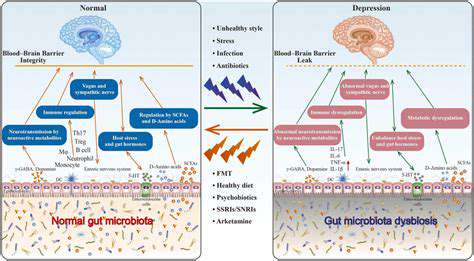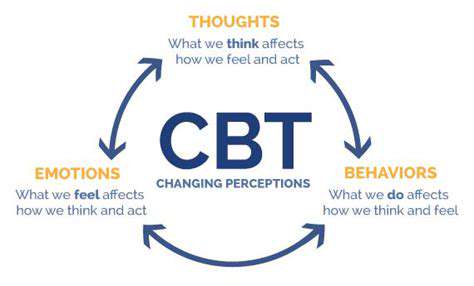Understanding Obsessive Compulsive Disorder (OCD)
Effective Treatments for OCD
Pharmacological Treatments
Pharmacological interventions play a crucial role in managing OCD symptoms, often used in conjunction with therapy. Selective serotonin reuptake inhibitors (SSRIs) are frequently prescribed as a first-line treatment. These medications work by increasing the levels of serotonin, a neurotransmitter linked to mood regulation and obsessive-compulsive behaviors. While SSRIs are generally well-tolerated, some individuals may experience side effects such as nausea, insomnia, or sexual dysfunction. It's essential to work closely with a psychiatrist to monitor medication effectiveness and adjust dosages as needed to optimize treatment outcomes. Proper monitoring is vital to ensure the medication is helping and not causing any unintended negative consequences.
Another class of medications, serotonin-norepinephrine reuptake inhibitors (SNRIs), can also be considered in cases where SSRIs are not effective or are poorly tolerated. SNRIs affect both serotonin and norepinephrine, potentially offering broader therapeutic benefits. However, they may also carry a higher risk of side effects compared to SSRIs. The decision to prescribe either an SSRI or an SNRI should be made in consultation with a healthcare professional, taking into account individual patient needs and potential risks and benefits.
Psychotherapeutic Approaches
Psychotherapy, particularly cognitive behavioral therapy (CBT), is a cornerstone of effective OCD treatment. CBT helps individuals identify and challenge the distorted thoughts and beliefs that contribute to their obsessive-compulsive behaviors. Through a structured approach, patients learn to recognize the triggers for their obsessions and develop coping mechanisms to manage and reduce compulsive behaviors. This process involves exposure and response prevention (ERP), a crucial component of CBT for OCD. ERP gradually exposes patients to their feared situations or obsessions while preventing them from engaging in their usual compulsive behaviors. This gradual exposure helps to reduce anxiety and desensitize individuals to their triggers.
Other forms of psychotherapy, such as supportive therapy and psychodynamic therapy, can also be beneficial in addressing the underlying emotional and psychological factors contributing to OCD. Supportive therapy provides a safe and empathetic environment for individuals to explore their feelings and experiences, while psychodynamic therapy delves into past experiences and relationships to uncover potential roots of the disorder. These approaches can complement CBT, providing a more comprehensive and holistic approach to treatment.
Combining pharmacological and psychotherapeutic interventions can often lead to the most significant improvements in OCD symptoms. The choice of treatment, whether medication or therapy, or a combination of both, should be individualized based on the specific needs and circumstances of the patient. Open communication and collaboration with mental health professionals are crucial for developing a personalized treatment plan tailored to achieve the best possible outcomes.
Living with OCD: Coping Strategies and Support Systems
Understanding the Challenges of OCD
Obsessive-Compulsive Disorder (OCD) is a chronic mental health condition characterized by intrusive, unwanted thoughts (obsessions) and repetitive behaviors or mental acts (compulsions) that a person feels driven to perform. These obsessions and compulsions significantly disrupt daily life, causing distress and impairment in various areas, including work, relationships, and social activities. Recognizing the specific challenges associated with OCD is crucial for developing effective coping strategies and seeking appropriate support.
The core difficulty lies in the constant battle against intrusive thoughts and the urge to engage in compulsive behaviors. This internal conflict can lead to feelings of shame, anxiety, and isolation. Individuals with OCD often experience significant distress and impairment, which can affect their ability to function effectively in daily life. Understanding these challenges is essential for building empathy and creating a supportive environment.
Developing Effective Coping Mechanisms
A crucial aspect of living with OCD is developing effective coping mechanisms. Cognitive Behavioral Therapy (CBT), a type of therapy specifically designed to address OCD, teaches individuals strategies to challenge obsessive thoughts and reduce the urge to perform compulsive behaviors. This involves learning to identify triggers, recognize distorted thinking patterns, and develop healthier responses to these thoughts and urges. This process is often gradual, requiring consistent effort and practice.
Mindfulness techniques can also be incredibly helpful in managing OCD symptoms. By focusing on the present moment, individuals can detach from obsessive thoughts and reduce their power over their experience. Practicing relaxation techniques, such as deep breathing or progressive muscle relaxation, can also provide a sense of calm and control during periods of heightened anxiety. These coping mechanisms are not a cure, but rather tools for managing the symptoms and improving overall well-being.
Seeking Support and Building a Strong Network
Living with OCD can be isolating, but it's important to remember that you are not alone. Building a strong support network is crucial for navigating the challenges of the disorder. This includes seeking support from therapists, support groups, and family members who understand and empathize with the condition. Open communication and shared experiences can provide invaluable insights and encouragement.
Connecting with others who understand the struggles of OCD can foster a sense of community and belonging. Support groups offer a safe space to share experiences, learn coping strategies from others, and gain a sense of validation. Family and friends can also play a vital role in providing encouragement, understanding, and practical support, such as helping with household tasks or childcare.
Seeking Professional Help and Treatment
Professional help is essential for effectively managing OCD. A mental health professional, such as a psychiatrist or therapist specializing in OCD, can provide a comprehensive assessment, develop a personalized treatment plan, and offer ongoing support. Treatment options often involve a combination of therapy, medication, and self-help strategies. Early intervention and ongoing treatment are crucial for improving outcomes and minimizing the long-term impact of OCD.
Medication, in some cases, can be an important part of the treatment plan. Antidepressants, such as selective serotonin reuptake inhibitors (SSRIs), are commonly prescribed to help regulate brain chemistry and reduce symptoms. The specific treatment approach will vary based on the individual's needs and preferences. Open communication and collaboration with a healthcare professional are essential for finding the best possible treatment strategy.
Read more about Understanding Obsessive Compulsive Disorder (OCD)
Hot Recommendations
-
*Guide to Managing Gout Through Diet
-
*Best Habits for Financial Well being
-
*How to Build a Routine for Better Mental Health
-
*How to Eat Healthy on a Budget [Tips & Meal Ideas]
-
*Guide to Practicing Self Acceptance
-
*How to Incorporate More Movement Into Your Day
-
*Guide to Managing Chronic Pain Naturally
-
*Guide to Building a Reading Habit for Well being
-
*Top 5 Weight Loss Supplements That Actually Work
-
*Best Exercises for Postpartum Recovery [Beyond Abdominal Work]









